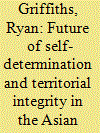| Srl | Item |
| 1 |
ID:
131357


|
|
|
|
|
| Publication |
2014.
|
| Summary/Abstract |
The twentieth century saw the rise of two important and interrelated norms. The first is the norm of self-determination, which advances the right of stateless nations to govern themselves. The second is the norm of territorial integrity, which upholds the principle that political borders should be respected. A consequence of these norms has been an increase in secessionism, a decline in conquest, and a proliferation of states. This paper will examine the development of these norms, their interrelationship, and their prospects for the future. Attention will be given to three important questions: (1) Under what conditions does a norm endure beyond a power transition? (2) How likely is an ascendant China or India to support the norms? (3) What does a power transition and the corresponding support of these norms augur for the future of secession, conquest, and the number of sovereign states?
|
|
|
|
|
|
|
|
|
|
|
|
|
|
|
|
| 2 |
ID:
135293


|
|
|
|
|
| Summary/Abstract |
This article argues that 1945 constitutes an historical inflection point from a period of state expansion to state contraction and that this transformation is primarily the result of changes at the international level. Just as security and economic pressures drove lead states to expand in earlier times, changing conditions in the post-1945 period led to a contraction in state size. The change from multipolarity, the development of the territorial integrity norm, the shift to nuclear deterrence, and the burgeoning global economy contributed to the milieu in which states evaluate the costs and benefits of holding territory, and this has enabled states to permit secession more frequently. The result has been an increase in the rate of peaceful secession and a corresponding proliferation in the number of sovereign states. I test this argument both qualitatively and quantitatively using original data on secessionist movements and internal administrative regions between 1816 and 2005.
|
|
|
|
|
|
|
|
|
|
|
|
|
|
|
|